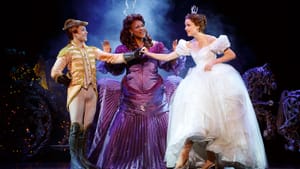Stay in the Loop
BSR publishes on a weekly schedule, with an email newsletter every Wednesday and Thursday morning. There’s no paywall, and subscribing is always free.
Role models for modern women?
Cinderella and Wonder Woman

I grew up with Cinderella. I also grew up with Wonder Woman — the comic book, not the TV series — but didn’t realize how extraordinary she was. In my childish mind, if there was a Superman, of course, there was a Wonder Woman, even though she didn’t appear until 1941 and Superman had been around since 1938.
Both Cinderella and Wonder Woman were in town recently, in quite different forms, which got me thinking about how I might reconcile the contrasting aspects of womanhood with which I had been raised.
I grew up reading Cherry Ames, Judy Bolton, and Nancy Drew, all brave bold young women who encountered danger and didn’t always depend on a man to save them. Raised in a house with four strong women — Dorothy, my mother; Nana, the nurse; Eva, the housekeeper; and Frieda, the maid — the power of women was evident. That their activities all revolved around taking care of my father and running his house for him was less clear to me at the time.
I also grew up reading fairy tales and dreaming of a Prince Charming, though, my mother assured me, he would never look twice at me unless I ___. Fill in the blank with everything you’ve ever been told about how to catch a man — look good at all times, know how to run a house, sew a fine seam, please him. My mother didn’t know how to cook so, lucky for me, that was not on my must-do list. The expectation was that I would hire another woman to do that for me.
Models of empowerment
In a funny way, both Wonder Woman and Cinderella are models of empowerment, though neither is a woman who achieved her goal unaided. Cinderella had a fairy godmother, and Wonder Woman/Diana Prince had her Amazon heritage and a magic lasso and sometimes an invisible plane. But both said to me that women can succeed, dreams can come true. And to a young woman without any discernible magical powers or access to a fairy godmother, that meant a lot.
They also taught me that success doesn’t come without a price. While both were princesses in their childhood homes (Cinderella’s father adored her and treated her to expect love and caring; Wonder Woman was a warrior princess raised to lead in a world of women), both had to undergo trials in the real world (Cinderella became a drudge, while Wonder Woman gave up eternal life). And they continued to be tested: Cinderella, even after she has met the prince, cannot escape having to clean the house and serve her sisters, and Wonder Woman is constantly being captured and bound before she escapes and saves the day.
But how do these two iconic figures hold up in the modern world?
A feisty Cinderella
I encountered a new, feistier Cinderella in the updating of the Rodgers and Hammerstein musical at the Academy of Music. Ella (Paige Faure) decides whether the Prince, Topher (Andy Jones) gets to keep her shoe and conspires with her stepsister Gabrielle (Ashley Park) to disobey her stepmother, Madame (Beth Glover). The songs are sung with an edge that wasn’t in the original TV show, and the Fairy Godmother, Crazy Marie (Kecia Lewis), who can belt out a song while flying, is not all happiness and light. The Prince is a rather inept young man who listens to a corrupt advisor until he is shown the light by Cinderella’s stepsister’s anarchist boyfriend, a character who is a commentary on the whole privilege and power corruption theme.
A bit convoluted perhaps, but the little girls there in their princess dresses and sparkly tiaras were enthralled by the costume changes that transformed a hag into a godmother and a scullery maid into a princess right before our eyes — those costume changes being rightfully one of the stars of the show. For those little girls, it was perhaps a dream of their future; for jaded feminists, it was a reminder that dreams often don't turn out the way we expect.
An era-straddling figure
Wonder Woman came in the form of a Free Library talk by Jill Lepore, chair of the History and Literature Program at Harvard, about her new book The Secret History of Wonder Woman. Lepore prefaced her remarks by justifying her academic interest in Wonder Woman, whom she sees as the bridge between the two waves of feminism. It was unfortunate that she felt she had to justify her interest.
 Wonder Woman, Lepore says, presents an interesting dilemma for the modern feminist. Created by psychology professor William Marston (a man, albeit one who lived openly with two women), was Wonder Woman truly a feminist symbol? Or is she, like the more recent Xena and Lara Croft, a masculine fantasy who combines a smoking hot body with physical strength and the ability to fight like a man while still being a sexual object?
Wonder Woman, Lepore says, presents an interesting dilemma for the modern feminist. Created by psychology professor William Marston (a man, albeit one who lived openly with two women), was Wonder Woman truly a feminist symbol? Or is she, like the more recent Xena and Lara Croft, a masculine fantasy who combines a smoking hot body with physical strength and the ability to fight like a man while still being a sexual object?
Marston, who also invented the lie detector, was strongly influenced by the suffrage movement rampant in Cambridge while he was a student at Harvard in the 1910s. He seemed to practice what he believed about women’s liberation — his wife, Elizabeth "Sadie" Holloway, with a master’s in psychology from Radcliffe, continued to work, while his former student, Olive Byrne, niece of birth control activist Margaret Sanger, lived with them and raised the children.
Chaining feminine power
Marston believed women should rule the world. On the other hand, he still clung to some traditional masculine notions. Lepore points out that Wonder Woman is frequently bound in chains, but whether as a symbol of the repression of feminism or to indicate the fragility of women needing to be tamed by the dominant male will continue to be fodder for interpretation.
But where is Wonder Woman today? Her popularity has waned and so has her story line. Other heroines have come along in the meantime, but I’m still waiting for a superheroine who is truly revolutionary, one who can succeed without spangles and a weapon and who isn’t waiting to be rescued by Prince Charming.
For Steve Cohen’s review of Cinderella, click here.
What, When, Where
Rodgers & Hammerstein’s Cinderella. Music by Richard Rodgers, lyrics by Oscar Hammerstein II, new book by Douglas Carter Beane. Mark Brokaw directed. November 25-30, 2014 at the Academy of Music, Broad and Locust Streets, Philadelphia. 215-893-1999 or www.kimmelcenter.org.
Jill Lepore, “The Secret History of Wonder Woman,” December 4, 2014, Free Library of Philadelphia, 1901 Vine St, Philadelphia. 215-567-4341 or www.freelibrary.org/authorevents.
The Secret History of Wonder Woman by Jill Lepore, Knopf, 2014. Available at Amazon.
Sign up for our newsletter
All of the week's new articles, all in one place. Sign up for the free weekly BSR newsletters, and don't miss a conversation.

 Naomi Orwin
Naomi Orwin